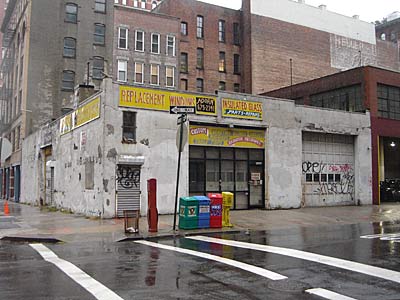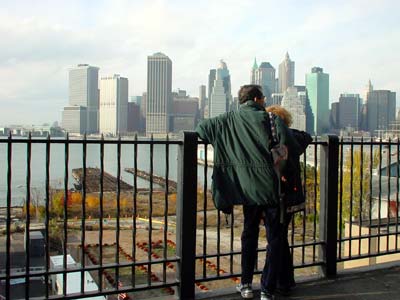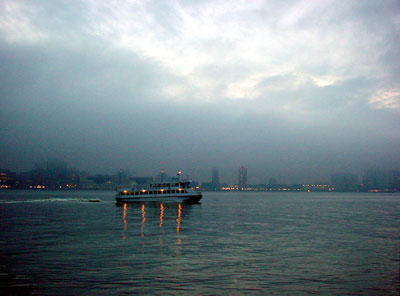 |
NEW YORK CITY GUIDE: SOME NEIGHBORHOODS
Offbeat destinations for adventurous visitors
(Words: ©ablarc from Wired New York; Photos:© urban75)
WEST VILLAGE, BROOKLYN HEIGHTS, HOBOKEN
(each is worth a half-day, even if you're on a whirlwind tour)
West Village.
The nicest of the nice. (subway Sheridan Square; go into the fenced square for a Segal surprise). Here there be plutocrats: captains of finance, advertising, publishing and entertainment.
You'll spy them in tee-shirts on weekends, walking their dogs or heading for leather bars.
The tree-lined streets of finely-detailed 19th Century town houses are both harmonious and stylistically diverse. As this is the northernmost outpost of New York's pre-Madison Plan organic grid, these fine-grained houses are superimposed on a street pattern that may remind you of Paris.
The Avenues play the role of, well...avenues, while Hudson Street, where Jane Jacobs lived and wrote, is sort of a cross between the rue Mouffetard and Boulevard St. Germain.
At its heart, don't miss quietly beautiful, Parisian, refurbished Abingdon Square and the adjacent White Horse Tavern, where Dylan Thomas drank himself into a coma. This is now primarily a tourist destination with a solid underlayment of local regulars, like some London pubs.
Be sure you go all the way out to the (Hudson) River to the handsome new park with its astroturf piers and look back to admire Richard Meier's three graceful and fine-scaled glass towers: vacant stacks of celebrities. Late in the afternoon, you may see mammoth cruise ships glide by, ocean-bound.

South of here lies faux-gritty but even richer Tribeca, and to the north they pack meat --though less of it all the time. Above even that you'll find Chelsea, where poverty coexists unhomogenized with artists, bohemians, gays and the usual yuppies.
People often say nice things about Chelsea but I find it boring.

Brooklyn Heights.
The next-to-nicest of the nice. (subway Clark Street or Borough Hall) Solid bourgeois houses here are more overtly Victorian than in the West Village, though a few go way back to colonial times, and some are even wood-clad. Joralemon Street is a nice neighborhood shopping street that may remind you of Notting Hill, though less funky.
Here you'll find mews and a really nice mix of building types - as diverse as Washington's Georgetown.
My favorite street: unassuming but terminally picturesque Willow Place (not Willow Street, look for it on a map) with its sprinkling of Miesian block rowhouses mixed with Greek Revival colonnades, a church and even a small power station.
My idea of the city as it could (should) be without the dead hand of zoning. Stupendously pretty but not precious, and still a little gritty.

The glory here is the (East) River Promenade with its TwinTowerless Downtown skyline view with Brooklyn Bridge. This Promenade is cantilevered out over a multi-tiered highway, which is thus neutralized as an environmental liability. Brilliant.
If there's money burning a hole in your pocket, the River Café beneath the Bridge will scorch the contents of any size wallet with alfresco dining or drinks and a million dollar view. The interior's pretty nice too, in a high-toned cosa nostra kind of way.
Walk back to Manhattan on the Bridge. Or take a water taxi if you're tired.

Hoboken.
I find this place absolutely amazing: yuppie central on a red-brick grid. Nice enough to be a part of Manhattan, but it's in another state [though the PATH subway does get you there in a few minutes from Herald Square or Ground Zero (or take a ferry from Battery Park City)]. Like Manhattan, it's built on a grid of oblong blocks.
Presently many similarities link it to Brooklyn Heights and the West Village.
These include: 19th Century red-brick rowhouse infrastructure, a prosperous population, a nice mix of commerce and residences, walkability due to absence of parking lots, beautiful riverfront parks with views, resistance to [very] high-rise development, and easy subway access.
A difference is that Hoboken sank deep into a trough of slumhood; when Sinatra was born there it was rough enough for him to be ashamed of.
He saw himself as an escapee from the dense, violent, gangster-ridden little city of stevedores chronicled by Elia Kazan in On the Waterfront; like New Orleans, Hoboken boosted Brando to stardom.

The vast scale of container shipping vaporized Hoboken's dainty piers and cranes without a trace. Their replacement is Frank Sinatra Drive, a glitzy waterfront parade of elephantine lumps in postmodern style; it may remind you of some of the newer places along the Thames.
After sampling Sinatra's pleasures, be sure you get up away from it into Hoboken's viewless residential and commercial core, which lies along handsome Washington Street (disfigured by one or two bank parking lots).
Vanished along with the cranes are the stevedores. These seem to have been replaced by an army of trust-fund kids.
I can imagine the baby boomers' reasoning as they plunk down payment on junior's condo: "there's a river between here and that bad ol' city full of drugs and disease; Junior'll be fine here, and he can visit the kulchur on weekends.
After he gets married and needs a bigger place, we can either flip the condo or retire to it ourselves."
What Junior actually does on weekends is get drunk. He does that mostly in Hoboken, which is full of dating bars, and he's even joined by college buddies from the City.
Reminds me of Miami Beach: weekend eves feature acres of tasty tanned flesh scantily framed in designer-dud glitter (even in cool weather; you know what that's about). Saturday night, it's a mating dance.
At 10 pm the PATH subway to Manhattan (ten minute ride) is packed with revelers--about evenly divided, I reckon, between Hobokenites headed for a night on the town and Manhattanites returning from their evening on the [other] town.
Check out the calamari, the view, the passersby and the clientele at Quay.
Truly the sixth borough, though a miniature. Everything looks good in Hoboken. And the views of Manhattan...
|
« back to New York home More neighbourhoods »
|
|
 |
|

